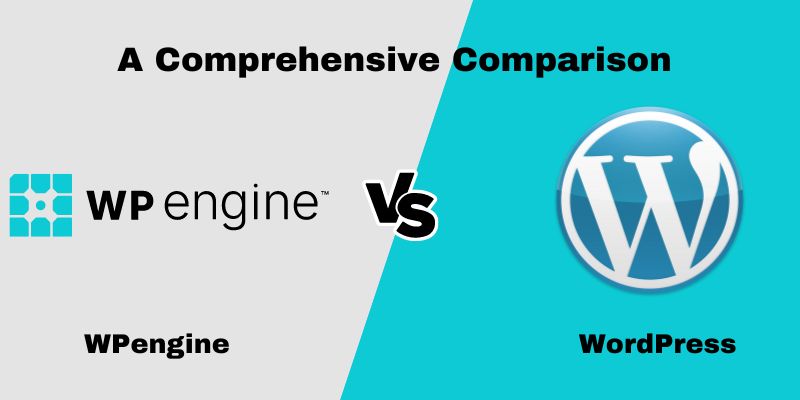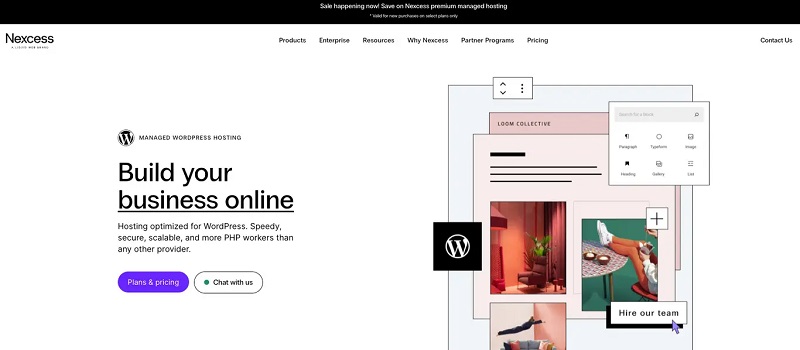
WPEngine vs WordPress: A Comprehensive Comparison of for Enterprise Websites
In this article, we will discuss the differences between WPEngine vs WordPress.
Those who are familiar with WordPress and have read WPShout for a long time might want to pass on this one. However, I was intrigued and thrilled to be given this entertaining explanatory piece to write for individuals who are unfamiliar with WordPress.
We’ll discuss the differences between WordPress, an open-source software that may operate on a variety of WordPress web hosting packages, and WP Engine, a product (really a “hosting company”) in this piece.
What is WordPress?

The main reason “WordPress” might be puzzling to many people is that it is made up of three distinct elements. Understanding “the web” in some way is necessary to comprehend what WordPress is full of. In a nutshell, I would say this:
“A range of hosting environments that support PHP can host WordPress, an open-source content management system.”
Let’s analyze that.
Open-source refers to WordPress’s ability to be modified and your access to its source code. You may skip this section if you don’t grasp “source code”; it’s more of a fascinating detail than a crucial concept. The “words and grammar” that programmers enter into software to make it function is called source code. If you conceive of source code as “steps the computer follows written in English,” you come quite close to the appropriate understanding—even if it’s not quite like English.
WordPress may be used to create web pages without the need for programming knowledge as it is a content management system (CMS). Typically, you would upload your “blog posts,” “articles,” etc., to a content management system (CMS) like WordPress. From there, you may stylize and embellish those words with bold font, photos, and other formatting options, exactly as you might be accustomed to from Microsoft Word in the “desktop publishing” world.
In essence, to be hosted is to be “safely made available on the internet.” Several firms provide you with a location to execute a web application. Among them are GoDaddy, Bluehost, Siteground, and a few others that you might be familiar with.
More misunderstanding between WordPress.org and WordPress.com
One final quirk that adds an odd touch. There are two things: the previously mentioned “WordPress.org” and “WordPress.com,” which you may have heard promoted on podcasts, TV ads, and other media. WordPress.com is essentially WordPress.org “hosted” at a fancy domain.
I could go on and on, but that should be plenty in this context. For a more in-depth discussion on this subtopic, see our comparison of WordPress.org vs WordPress.com.
WP Engine: What is it? “A hosting provider for WordPress”

Several hosts will thus host your “WordPress.org” website. Although GoDaddy, Bluehost, Digital Ocean, and WP Engine are also “web hosting companies happy to let you run a WordPress site,” WordPress.com was merely mentioned.
As its name suggests, WP Engine concentrates more on WordPress than some of those other businesses. But they’re only one among others. For even more choices, see our carefully curated list of the top WordPress hosting providers.
1. Understanding the Platforms
WordPress:
- Open Source: WordPress. Org provides a 100 % free CMS that can be hosted on the user’s servers.
- Customization: Themes, plugins, and custom code are completely customizable by the users.
- Self-Managed: The users are expected to participate in matters concerning updates, security, backup, and management of the servers.
WP Engine:
- Managed Hosting: WP Engine can be described as a WordPress-optimized hosting service provider.
- Performance Optimization: It encompasses features, for example, Cache and CDN, and performance analyzer.
- Security: Gives improved security features, can install updates, and contains backup versions for your work.
- Support: Specialized in WordPress services support.
2. Performance
WordPress:
- Hosting Dependence: As the case is with most shared services, reliability depends on the web host provider.
- Optimization: Caching, CDNs, and more users have to implement performance optimizations themselves.
WP Engine:
- Built-In Performance: Provides high-level caching, CDN compatibility, as well as most of the server-level tweaks right from the start.
- Speed: Usually delivers quicker page loads and better performance due to the efficient setup.
3. Security
WordPress:
- User Responsibility: Security configurations must be set by users; often, security plugins need to be installed, as well as updates.
- Vulnerability: More likely to have security problems if not well maintained.
WP Engine:
- Managed Security: Also, it encompasses the ability to automatically update the WordPress site, create daily website backups, and detect threats in advance.
- SSL Certificates: This is free and their SSL certificates automatically renew.
- Staging Environments: Offers means for testing updates and changes before going live on the main site or application.
4. Ease of Use
WordPress:
- Learning Curve: Requires more technical information storing information, updating, and querying its performances.
- Flexibility: Less limitation in the design and construction of intricate web locations.
WP Engine:
- User-Friendly: User-friendly control panel and the automation of some processes in managing the WordPress sites.
- Support: Availability to have expert assistance all day or even at night should some problem arise and one needs advice.
5. Cost
WordPress:
- Variable Costs: It involves costs associated with registration of the host, domain, and premium themes as well as the plugins.
- Scalability: Prices may rise in terms of having to articulate for more tools or go for higher grades of plugins.
WP Engine:
- Premium Pricing: Hence, the costs are slightly higher because of the managed services that start at $30 per month.
- All-Inclusive: They include; Hosting, security, performance optimization, and support.
6. Scalability
WordPress:
- Hosting Limits: Since the installation of the web app is done through a hosting provider and using a specific plan, scalability depends on the provider and the plan.
- Manual Upgrades: Some of the limitations may include: Users can be required to upgrade hosting plans on their own and may be required to manage the server resources on their own.
WP Engine:
- Auto-Scaling: Designed to be capable of handling variances of traffic and self-proliferated resources, respectively.
- Enterprise Solutions: Has Enterprise plans for high-traffic websites and personal support.
7. Support and Maintenance
WordPress:
- Community Support: Depends on the community boards, resources, and other independent developers to get help.
- DIY Maintenance: As for the functionality, users are also to be in charge of the site maintenance and its troubleshooting as well as updates.
WP Engine:
- Dedicated Support: For customer support, there is a 24/7 chat, phone, and email support option from expert assistants.
- Managed Maintenance: Responsible for updating and patching as well as maintaining the backup copy.
8. Customization and Flexibility
WordPress:
- Unlimited Customization: Gives numerous choices with easy access to numerous themes and plugins.
- Developer-Friendly: Best for the developer who wants total control of the design and functionality of the website.
WP Engine:
- Curated Plugins and Themes: Endorsed by several plugins and themes, though there are limitations for the ones that may hinder flexibility, speed, and security.
- Developer Tools: Offers tools that are useful to the developers, such as SSH access for Git, other platforms’ quotas, and staging.
9. Use Cases
WordPress:
- Versatile: Best for bloggers and small and large Businesses that require a highly customizable CMS.
- Independent Control: For those who prefer to have full control of the whole process of website creation and do not mind the technology part of it.
WP Engine:
- Specialized: Perfect for companies requiring a high-performance WordPress website with little to no time or means to deal with hosting and security issues.
- E-Commerce and High Traffic: Great for shopping carts, heavy and popular WordPress blogs, and big businesses that need solid help and velocity.
10. SEO Capabilities
WordPress:
- Plugins: To increase the SEO, there are some plugins available, such as Yoast SEO or All in One SEO Pack.
- Manual Optimization: Content has to be optimized for SEO, and the images and structure of the site have to be optimized by users manually.
WP Engine:
- Built-In Tools: Here, the SEO tools and optimization are integrated into the managed hosting plan that the company offers.
- Advanced Analytics: Has rich features for analyzing the current SEO results and revealing ways for their enhancement.
11. Backup and Restore
WordPress:
- Manual Backups: Users are required to create and maintain their copies on their own.
- Plugins: Many backup plugins exist; however, they have to be configured and monitored.
WP Engine:
- Automated Backups: Daily automated backup solutions with easy-to-access click restoration solutions.
- Disaster Recovery: Detailed disaster recovery plan and assistance provisions to maintain database acumen.
12. Staging Environment
WordPress:
- Manual Setup: Users have to set up a staging environment on their own or resolve to plugins.
- Testing: Basic testing facilities if no other equipment is available.
WP Engine:
- Integrated Staging: Provides pre-production environments for the development and testing of changes and updates before the production environment.
- Safe Updates: Incorporate basic features of version control with low exposure to the live site for updates and releases.
13. E-Commerce Integration
WordPress:
- WooCommerc: Users are in a position to set up/install WooCommerce to run an online shop.
- Customization: Sophisticated possibilities to design online shops.
WP Engine:
- Optimized for WooCommerce: Boots and enhances your site speed and security, tailored for WooCommerce.
- Scalability: Finding ways to optimize, manage, and efficiently use bandwidth with managed hosting solutions, especially for large business-oriented e-commerce sites.
14. Migration
WordPress:
- Manual Migration: It requires the user to manually transfer its site or use other migration tools to move the site.
- Potential Downtime: Damage to the business in terms of time and data if the change is not implemented properly.
WP Engine:
- Automated Migration: Provides easy automated migration tools and personal assistance in moving a site to the new service.
- Zero Downtime: Migrates data quickly without disrupting the users’ applications and data for brief periods or, in the extreme, not at all.
15. Analytics and Reporting
WordPress:
- Plugins: It, nevertheless, has simple setting-up boxes where users can fit analytics plugins such as Google Analytics to track the performance of the site.
- Custom Reports: This needs to be set up if a client needs reports of a particular type.
WP Engine:
- Integrated Analytics: Allows departments that require integrated analytics and reporting tools to get intricate data.
- Performance Monitoring: These include continuous monitoring of the performance and alerts.
16. Community and Ecosystem
WordPress:
- Vast Community: Big community with a lot of information, groups, and unofficial add-ons.
- Plugins and Themes: The availability of plugins and themes that support WordPress, and millions of them are free while others are premium.
WP Engine:
- Exclusive Resources: Participation in case only, access to all other case resources such as webinars and expert advice.
- Partnerships: Some of the solutions highlighted include the involvement of leading WP developers and agencies to join the platform for premium products.
FAQ: WordPress.com vs. WP Engine
What are the differences in price between WordPress.com and WP Engine?
WP Engine has a tiered price structure according to the features and service levels offered. It is regarded as a higher-end hosting choice because of its superior features, support, and infrastructure.
A variety of plans are available on WordPress.com, ranging from a free tier with limited functionality to premium ones with more customization possibilities. Because the platform may accommodate different budgets, individuals with minimal demands can utilize it at a lower cost.
What type of customer service is offered to WordPress.com and WP Engine users?
WP Engine offers live chat, email, and phone assistance around the clock. The support staff is made up of WordPress specialists who provide thorough and prompt assistance with a variety of problems.
For users on the free plan, WordPress.com provides email and forum assistance. Users of the Premium Plan may receive priority email assistance and live chat. Although often prompt, the assistance might not be as extensive as that offered by WP Engine.
What security features do WordPress.com and WP Engine offer?
WP Engine prioritizes security and provides tools like firewalls, automated WordPress upgrades, and daily backups. The proactive strategy of the platform aids in safeguarding websites from any attacks.
Automated updates and regular security audits are two ways WordPress.com emphasizes security. Compared to WP Engine, consumers have less control over certain security parameters, even if it offers a safe hosting environment.
Conclusion
When to Choose WordPress:
– Require full control over your website and are OK with doing the hosting, updating, and security by yourself.
– You are restricted with money and would rather buy individual plugins or themes as you require them.
– If you like what you are doing, whether you build the site from scratch or redesign it, you have maximum freedom.
When to Choose WP Engine:
– Demand a trouble-free package of managed hosting service with excellent quality and high security.
– Need professional assistance and automatic interaction to spend more time on content and business development.
– Work for a website that experiences high traffic or a web store that requires an effective server foundation and the ability to grow.
Therefore, the choice between using WordPress and WP Engine depends on the niche, complexity, IT literacy, and finances. However, WordPress is more flexible and allows more customization than WP Engine, which provides a more secure, well-optimized managed host service that is also time- and cost-saving. Think about and take into consideration your goals for the future, the complexity of the website, and your abilities to work and manage the technical side of the site.
You can also read our related articles: